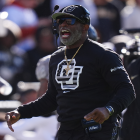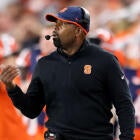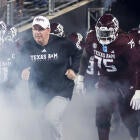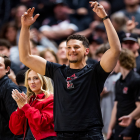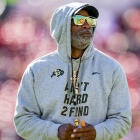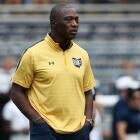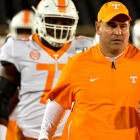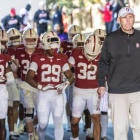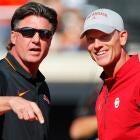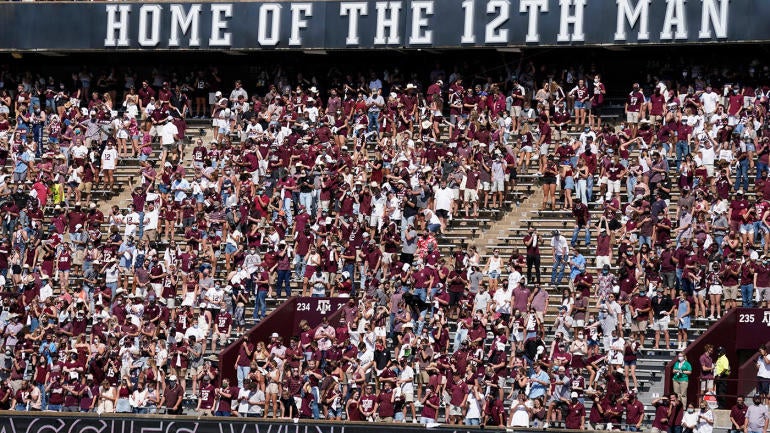
Dan Mullen was smacked upside the headset this week by COVID-19. Nineteen of his players tested positive the same week Florida's coach advocated for his administration to allow fans to "pack The Swamp" this week against LSU to foster a "competitive advantage." Never mind a packed stadium being antithetical to those players' health -- at least for now and probably for a while.
Despite Florida Gov. Ron DeSantis recent decree that stadiums can be filled to capacity, University of Florida officials have said they will continue to adhere to safety guidelines. College and professional teams across the state have as well. Mullen will have to find his competitive advantage elsewhere during a global pandemic.
Meanwhile, multiple medical professionals reached by CBS Sports say there indeed a long way to go before we're sitting shoulder-to-shoulder in full stadiums again.
"I think we should assume that we're going to be exactly where we are today 11 months from now, until proven otherwise," said Dr. Michael Saag, UAB professor of medicine and infectious diseases.
Saag is referring to the beginning of the 2021 season, which is 10 ½ months away. Even with a COVID-19 vaccine, these medical professionals say an assumption that this is a one-and-done year for coronavirus inconvenience is misguided.
"The short answer is: Once a vaccine is developed and mass-administered, maybe next [football] season," said Zach Binney, an epidemiologist at Emory University. "But that depends a lot on the competence of and logistics of a national vaccination itself."
That is a huge undertaking, according to Dr. John Ervin, who is overseeing some of the nation's most important COVID-19 vaccine clinical trials at the Center for Pharmaceutical Research in Kansas City, Missouri.
"Until we get a proven vaccine that works, it may be that this [coronavirus] is going to mutate," Ervin said. "We may have to change to a different vaccine. I think we're waiting until easily next year until we get on top of this. And then it really has to do with the acceptance of vaccinations. I pray to God that the anti-vaxxers [don't grow]."
Ervin added that, in a best-case scenario, stadiums will be at capacity next fall. A vaccine could be ready by next year, but there are multiple issues at hand. In order to get back to filling stadiums, the vaccine needs to be widely distributed, and it needs to be determined not only who to let in to those stadiums but how.
Ervin pointed out that team may want to identify who has been vaccinated before admitting them into a stadium. If not, what's the point stamping out COVID-19? A February soccer match in Italy has already been linked to being the event that spread the virus throughout the country.
"We don't need more evidence to know [filling stadiums] is a bad idea," Binney said. "And anyone who says, 'But they'll wearing masks,' I'd encourage you to look at crowd shots of any SEC game this year. Take a deep breath and try saying [that] to me with a straight face again."
College basketball is still modeling its season will look like with the added risk of playing in indoor arenas. What franchise or school wants to originate a super spreader event if they pack their stadiums too quickly?
"Are you going to demand that fans show evidence they've been vaccinated?" Ervin said. "How do you handle that -- give an ID to someone who's had their vaccine so they can show it? I guess it would be totalitarian, but for the good of the public, that would be a good way to do it."
Actually, those solutions have already been thought through.
GuideSafe was developed by a team of UAB doctors to provide exposure notification. MovementPass, a Norway-based company, has developed an immunity passport app that would not only streamline entry into stadiums but also theaters and concert events.
"There is a gap between any medical solution for COVID and public confidence to enter into spaces with other people," said Graeme Codrington, a South Africa-based consultant for MovementPass. "… This allows people to quickly prove their immunity status on entry to venues, sports events and concerts."
It's difficult to project to next week let alone next season. Consider the plight of the SEC right now. Vanderbilt-Missouri has been postponed. Florida-LSU might be headed that way. The conference had sailed through the first first three weeks of its season without rescheduling a game, but even the mighty SEC wasn't immune in the end.
"When they're not here at the facility, I don't know what they're doing," Georgia coach Kirby Smart said of his players. "We're one positive, one outbreak away from losing some guys."
Saag isn't certain any person can become immune after catching COVID-19. The doctor recovered from the coronavirus himself earlier this year.
"We're seeing many patients coming in with their second round of infections," Saag said. "… It's not totally hopeless. I know I'm sounding like a Nancy here, but the point is there is so much we still have to learn about this virus."
That means not necessarily taking the advice of a football coach on the subject of a worldwide pandemic. Mullen popped off after losing at Texas A&M where the stadium seemed to be filled with far more than the 24,725 that were permitted and announced.
"Hey Dan, you got bad eyes, man," Texas A&M athletic director Ross Bjork joked.
The Texas governor has allowed 50% capacity in stadiums. Out of an abundance of caution, Texas A&M set its own capacity at 25% (27,500) for the 102,733-seat Kyle Field. For the showdown against Florida, the announced attendance was 24,275, a shortfall of 2,275 fans.
"We sold them all but there are some people that just don't come," Bjork said.
Ben Hill Griffin Stadium is operating 20% capacity with the Gators allowing 17,000 fans for home games. However, like at Texas A&M, a smaller number of 15,000 fans showed up at The Swamp for Florida's home opener vs. South Carolina two weeks ago.
There are no-shows at almost every game for a variety of reasons. During a pandemic that continues to be a growing concern, until further notice, there will always be a percentage of fans who do not attend any large event out of concern for their health.
After speaking with Harvard economics professor Raj Chetty recently, Bloomberg News concluded: "No matter how many businesses are allowed to reopen, normal economic life will not resume until … customers feel they're no longer at risk of contagion."
That's where the sociological impact of the coronavirus comes in. The political aspect has been overwrought. Still, Binney believes one of the Florida teams -- based on DeSantis' decision -- will try to fill a stadium before it is safe.
"[Teams] all like a toddler being told over and over again not to stick a fork in the light socket," he said. "… They won't learn their lesson until they get shocked. So I think it's very possible in this country we see 100% capacity stadiums before it's appropriate, including this season."
College ADs like Bjork have to balance safety and liability against the bottom line. Texas A&M athletics will lose approximately $55 million this due to a reduction in ticket sales and donations.
So far, limiting stadium capacity is simply the right thing to do.
"I think it was [Anthony] Fauci's quote, 'The virus dictates what happens, not anything else,'" Bjork said. "… This is going to go through the whole fiscal year. Then what happens next year? Are you going to have full stadiums? Are you going to be able to sell out your season tickets?
"Could this be a two-year impact?"
![[object Object] Logo](https://sportshub.cbsistatic.com/i/2020/04/22/e9ceb731-8b3f-4c60-98fe-090ab66a2997/screen-shot-2020-04-22-at-11-04-56-am.png)








